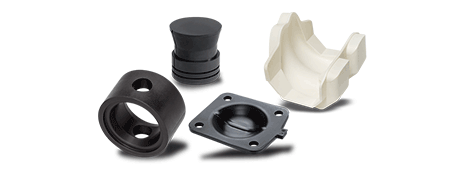Production processes for maximum reliability
Intercarat specialises in processing rubber and plastic. Our employees also manufacture composite parts (elastomer/plastic, rubber/metal, PTFE/metal). All processes – including those before the actual manufacturing process – are audited to DIN ISO 9001.
Wide range of incoming goods inspections
We obtain all raw materials from selected suppliers known for their excellent quality. All materials and compounds are subjected to extensive analyses in our laboratory before being stored or processed. Our employees test, for example:
- Shore hardness and micro Shore hardness
- Density
- Rheology/vulcametry
- Viscosity
- The composition of the mixture/compound.
Correct storage of raw materials
Elastomer raw mixtures in particular are subject to aging and react to temperature fluctuations. There is a risk, especially at higher temperatures, that the polymer chains link up – but this is not desired until the manufacturing process. For this reason, we maintain a temperature-controlled warehouse which is operated according to the FiFo principle (first in, first out). The storage of the PTFE powders is also temperature-controlled and is managed according to the FiFo principle.
For small-scale and medium-scale series
We use a three-shift system (3 x 8 h) and design our capacities for small-scale and medium-scale series. Our highly efficient machine shop allows for the manufacture of rubber and plastic parts, from 0.1 grams to 2 kilograms from batch size 1, enabling the production of up to 2,000,000 units per year.
Our manufacturing technologies
- Manufacture of precision parts made of elastomers using the IM procedure (injection moulding procedure) or the TM procedure (transfer moulding procedure)
- Manufacture of solid elastomer compounds using the CM procedure (compression moulding procedure) or the IM procedure (overmoulding of plastic/metal cores for special requirements)
- Manufacture of PTFE parts under cleanroom conditions based on class 9
We manufacture a large proportion of the moulded parts under vacuum pressure (TM and IM procedures). This prevents trapped air and air bubbles, which gives our products a very homogeneous structure and enables them to form particularly good connections/adhesion to other moulded parts. We offer common surface treatments for all materials.
Quality assurance throughout production
The key elements of our quality management are certification to DIN ISO 9001, compliance with numerous directives and standards, as well as an installed risk management system. We validate our production processes within this framework and produce out automated, continuous documentation for each moulded or composite part. This also guarantees the traceability of these parts.

